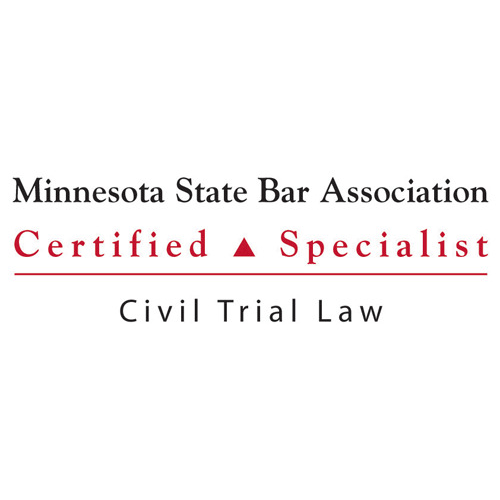
The practice of Civil Trial Law involves representing clients in legal disputes resolved through the court system, typically encompassing issues such as personal injury, contract disputes, and other civil matters. This practice area includes all aspects of litigation, from pre-trial proceedings to courtroom advocacy and appeals.
The Minnesota State Bar Association (MSBA) offers board certification in Civil Trial Law to attorneys who have met rigorous criteria, demonstrating their expertise and experience in this highly specialized field. To achieve this certification, attorneys must have substantial practice experience in civil trial law, pass a comprehensive written examination, and receive favorable peer evaluations. These requirements ensure that certified attorneys meet the high standards set by the MSBA, showcasing their proficiency and commitment to excellence in civil trial practice.
When seeking an attorney for civil trial law in Minnesota, it is crucial to consider whether the attorney is board certified in this specialty by the Minnesota State Bar Association (MSBA).
The MSBA’s Certification Board oversees the process for attorneys seeking to become recognized specialists in various practice areas. This certification process is governed by specific rules and standards established by the MSBA to ensure that only attorneys who meet rigorous qualifications are certified.
The Civil Trial Law Board Certification offered by the MSBA distinguishes attorneys who have demonstrated advanced expertise in handling civil trial cases. This certification indicates that the attorney has met the high standards of substantial experience, knowledge, and proficiency required by the MSBA.
Obtaining board certification in civil trial law offers numerous benefits. It serves as a mark of distinction, signaling the attorney’s expertise and commitment to excellence in this area of law. Additionally, certified specialists gain a competitive edge in the legal market, enhancing their professional reputation and instilling greater confidence in clients seeking legal representation.
Lawyer Legion maintains a directory of board certified civil trial law specialists in Minnesota. This directory provides the public with a valuable resource that allows them to narrow their search to local attorneys who have earned board certification in civil trial law by the Minnesota State Bar Association.
Lawyer Legion is the only commercial lawyer directory to properly acknowledge all ABA-accredited specialization programs and provide a dynamic directory of virtually every lawyer who has earned each certification, including board certification in civil trial law by the Minnesota State Bar Association.
Use this directory to connect with lawyers who are board certified specialists in civil trial law by the Minnesota State Bar Association. Start by choosing your county from the list below.
The Minnesota State Bar Association outlines specific requirements for lawyers seeking certification as Civil Trial Law Specialists. These requirements ensure that only highly qualified and experienced attorneys receive the specialist designation.
This focused summary emphasizes the critical components for board certification as a Civil Trial Law Specialist, highlighting the rigorous standards set by the Minnesota State Bar Association to maintain the quality and integrity of the certification.
The Minnesota State Bar Association (MSBA) outlines a detailed application process for lawyers seeking board certification as Civil Trial Law Specialists. Below is a breakdown of the key steps involved in this process:
This step-by-step overview provides a clear guide to the application process for becoming a certified Civil Trial Law Specialist, ensuring that all necessary criteria are met and the application is completed successfully.
The Minnesota State Bar Association (MSBA) outlines specific obligations and processes related to maintaining certification as a Civil Trial Law Specialist. This includes annual duties, the recertification process, and the circumstances under which a lawyer may be decertified. Below is a detailed summary of these requirements:
This summary provides an overview of the annual responsibilities, recertification requirements, and decertification procedures for maintaining the status of a Civil Trial Law Specialist. Compliance with these standards is essential to ensure ongoing recognition by the MSBA.
